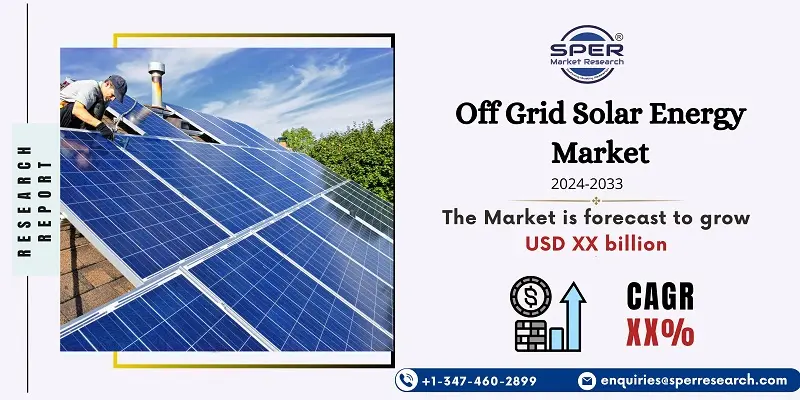
Off Grid Solar Energy Market Growth, Size, Trends, Share, Revenue, Demand and Future Outlook
Off Grid Solar Energy Market Size- By Application, By Technology- Regional Outlook, Competitive Strategies and Segment Forecast to 2033
| Published: Apr-2024 | Report ID: POAE2431 | Pages: 1 - 205 | Formats*: |
| Category : Power & Energy | |||
- September 2019: A call for bids was released by the Maharashtra Energy Development Agency (MEDA) in September 2019 in order to establish 126 kW of off-grid solar power plants, 88 solar street lights, and 10 solar base high masts at different places in Amravati, Maharashtra, India. The call was extended to qualified parties.
- October 2018: At the Fekola gold mine in Mali, West Africa, B2Gold authorized $38 million in October 2018 for the installation of one of the largest off-grid solar battery hybrid systems in the world.


| Report Metric | Details |
| Market size available for years | 2020-2033 |
| Base year considered | 2023 |
| Forecast period | 2024-2033 |
| Segments covered | By Application, By Technology |
| Regions covered | North America, Asia-Pacific, Latin America, Middle East & Africa and Europe |
| Companies Covered | Azuri Technologies, Barefoot Power, BBOXX, d.light, Fenix International, Greenlight Planet, M-KOPA Solar, Mobisol, Nova Lumos, Sunfire Solutions. |
- Rural and Remote Residents
- Outdoor Enthusiasts and Recreation Users
- Commercial Enterprises in Remote Location
- Humanitarian and Development Organizations
- Preppers and Self-Sufficiency Advocates
- Government and Policy Makers
- Eco-Conscious Consumers
- Architects and Residential Developers
| By Application: |
|
| By Technology: |
|
| By Region: |
|
- Global Off Grid Solar Energy Market Size (FY’2024-FY’2033)
- Overview of Global Off Grid Solar Energy Market
- Segmentation of Global Off Grid Solar Energy Market By Application (Industrial,
- Commercial, Residential)
- Segmentation of Global Off Grid Solar Energy Market By Technology (Crystalline Silicon, Thin Film, Others).
- Statistical Snap of Global Off Grid Solar Energy Market
- Expansion Analysis of Global Off Grid Solar Energy Market
- Problems and Obstacles in Global Off Grid Solar Energy Market
- Competitive Landscape in the Global Off Grid Solar Energy Market
- Impact of COVID-19 and Demonetization on Global Off Grid Solar Energy Market
- Details on Current Investment in Global Off Grid Solar Energy Market
- Competitive Analysis of Global Off Grid Solar Energy Market
- Prominent Players in the Global Off Grid Solar Energy Market
- SWOT Analysis of Global Off Grid Solar Energy Market
- Global Off Grid Solar Energy Market Future Outlook and Projections (FY’2023-FY’2033)
- Recommendations from Analyst
1.1. Scope of the report1.2. Market segment analysis
2.1. Research data source2.1.1. Secondary Data2.1.2. Primary Data2.1.3. SPER’s internal database2.1.4. Premium insight from KOL’s2.2. Market size estimation2.2.1. Top-down and Bottom-up approach
2.3. Data triangulation
4.1. Driver, Restraint, Opportunity and Challenges analysis4.1.1. Drivers4.1.2. Restraints4.1.3. Opportunities4.1.4. Challenges4.2. COVID-19 Impacts of the Global Off Grid Solar Energy Market.
5.1. SWOT Analysis5.1.1. Strengths5.1.2. Weaknesses5.1.3. Opportunities5.1.4. Threats5.2. PESTEL Analysis5.2.1. Political Landscape5.2.2. Economic Landscape5.2.3. Social Landscape5.2.4. Technological Landscape5.2.5. Environmental Landscape5.2.6. Legal Landscape5.3. PORTER’s Five Forces5.3.1. Bargaining power of suppliers5.3.2. Bargaining power of buyers5.3.3. Threat of Substitute5.3.4. Threat of new entrant5.3.5. Competitive rivalry5.4. Heat Map Analysis
6.1. Global Off Grid Solar Energy Market Manufacturing Base Distribution, Sales Area, Product Type6.2. Mergers & Acquisitions, Partnerships, Product Launch, and Collaboration in Global Off Grid Solar Energy Market
7.1. Global Off Grid Solar Energy Market Value Share and Forecast, By Application, 2020-20267.2. Global Off Grid Solar Energy Market Value Share and Forecast, By Application, 2027-20337.3. Industrial7.4. Commercial7.5. Residential
8.1. Global Off Grid Solar Energy Market Value Share and Forecast, By Technology, 2020-20268.2. Global Off Grid Solar Energy Market Value Share and Forecast, By Technology, 2027-20338.3. Crystalline Silicon8.4. Thin Film8.5. Others
9.1. Global Off Grid Solar Energy Market Size and Market Share
10.1. Global Off Grid Solar Energy Market Size and Market Share By Region (2020-2026)10.2. Global Off Grid Solar Energy Market Size and Market Share By Region (2027-2033)10.3. Asia-Pacific10.3.1. Australia10.3.2. China10.3.3. India10.3.4. Japan10.3.5. South Korea10.3.6. Rest of Asia-Pacific10.4. Europe10.4.1. France10.4.2. Germany10.4.3. Italy10.4.4. Spain10.4.5. United Kingdom10.4.6. Rest of Europe10.5. Middle East and Africa10.5.1. Kingdom of Saudi Arabia10.5.2. United Arab Emirates10.5.3. Qatar10.5.4. South Africa10.5.5. Egypt10.5.6. Morocco10.5.7. Nigeria10.5.8. Rest of Middle East & Africa10.6. North America10.6.1. Canada10.6.2. Mexico10.6.3. United States10.7. Latin America10.7.1. Argentina10.7.2. Brazil10.7.3. Rest of Latin America
11.1. Azuri Technologies11.1.1. Company details11.1.2. Financial outlook11.1.3. Product summary11.1.4. Recent developments11.2. BBOXX11.2.1. Company details11.2.2. Financial outlook11.2.3. Product summary11.2.4. Recent developments11.3. Barefoot power11.3.1. Company details11.3.2. Financial outlook11.3.3. Product summary11.3.4. Recent developments11.4. d.light11.4.1. Company details11.4.2. Financial outlook11.4.3. Product summary11.4.4. Recent developments11.5. Fenix International11.5.1. Company details11.5.2. Financial outlook11.5.3. Product summary11.5.4. Recent developments11.6. Greenlight Planet11.6.1. Company details11.6.2. Financial outlook11.6.3. Product summary11.6.4. Recent developments11.7. Jaza Energy11.7.1. Company details11.7.2. Financial outlook11.7.3. Product summary11.7.4. Recent developments11.8. M-KOPA Solar11.8.1. Company details11.8.2. Financial outlook11.8.3. Product summary11.8.4. Recent developments11.9. Nova Lumos11.9.1. Company details11.9.2. Financial outlook11.9.3. Product summary11.9.4. Recent developments11.10. Sunfire Solutions11.10.1. Company details11.10.2. Financial outlook11.10.3. Product summary11.10.4. Recent developments11.11. Others
SPER Market Research’s methodology uses great emphasis on primary research to ensure that the market intelligence insights are up to date, reliable and accurate. Primary interviews are done with players involved in each phase of a supply chain to analyze the market forecasting. The secondary research method is used to help you fully understand how the future markets and the spending patterns look likes.
The report is based on in-depth qualitative and quantitative analysis of the Product Market. The quantitative analysis involves the application of various projection and sampling techniques. The qualitative analysis involves primary interviews, surveys, and vendor briefings. The data gathered as a result of these processes are validated through experts opinion. Our research methodology entails an ideal mixture of primary and secondary initiatives.



Frequently Asked Questions About This Report
PLACE AN ORDER
Year End Discount
Sample Report
Pre-Purchase Inquiry
NEED CUSTOMIZATION?
Request CustomizationCALL OR EMAIL US
100% Secure Payment






Related Reports
Our Global Clients
Our data-driven insights have influenced the strategy of 200+ reputed companies across the globe.




















